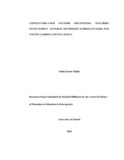| dc.description.abstract | Since independence, the Kenya government has remained committed to improve
the quality of education. The focus is to develop education policy and legal
framework to allow for accessible, efficient, effective and quality education for all
children by the year 2015.However, this has not been feasible in many parts of the
republic due to insecurity and conflict-related factors such as cultural orientations,
students’ indiscipline, parents’ level of education and religious affiliations that
have negatively affected teacher participation education and denied children their
rights to quality education. The aim of this study was to find out the extent to
which the conflict-related factors named influenced teachers’ involvement
contextualized to public secondary schools in Ijara district within Garissa County.
Descriptive survey design was employed for this study and the target population
involved is head teachers and their deputies, teaching staff and learners in Ijara
district within Garissa County. The sample comprised 715 respondents
comprising 666 students, 41 teachers and 4 principals and 4 deputy principals.
The major research instrument used was questionnaires to gather data from
principals, deputy principals, teachers and students. Document analysis was done
to obtain tabulated data from relevant sources. Data was coded, entered into SPSS
and analyzed thematically. Analyzed data was presented using histograms, tables
and charts. Through data analysis, the study found that, some of the cultural
orientations influencing teacher’s involvement in education include gender related
issues (61.11%), nomadic lifestyle (86.11%), use of local language (80.56%), and
community beliefs (52.76%) and early marriages (47.22%). The study also
established that indiscipline among students greatly influenced teacher
involvement in education, as attested by 94.44% of teachers, and 100% of the
principals. On the influence of parents’ level of education on teacher’s
involvement in education, 100% of principals and deputy principals, 80.56% of
teachers and 94.24% of the students were in agreement that it indeed played a
great deal of influence. 80.6 % of teachers and 24.48 %t and students also
affirmed that religious intolerance affected the participation of teachers in
education. Based on research findings, the study recommended maintenance of
regional balance in admission of students and hiring of teachers, and involvement
of parents, local administration and other stakeholders in education matters. The
study suggested further research on the influence of cultural practices on the
participation of the girl-child in education in public secondary schools. | en_US |



